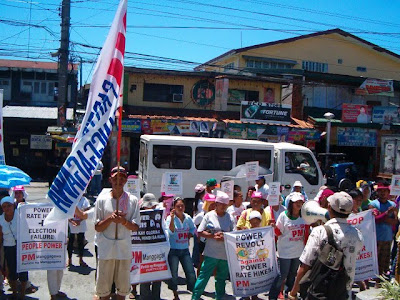NEWS RELEASE
NAGKAISA
28 November 2014
The emerging power crisis is a
cruel outcome of a bad policy under the Electric Power Industry Reform Act
(EPIRA) that cannot be resolved by the proposed emergency power President
Aquino is seeking from Congress, the labor coalition Nagkaisa said in a statement.
The group said it is not common
for ordinary workers to comment on techno-economic aspects of the power
industry, but for this coming celebration of Bonifacio Day on November 30, labor will come out loud on
this along with other big issues because the high cost of power in the country
is making the lives of ordinary workers more miserable.
According to Wilson Fortaleza,
spokesperson for Partido Manggagawa (PM) and one of the convenors of Nagkaisa,
“this quick-fix solution via an emergency power to address a
decade-old problems of escalating rates and diminishing supply reignited
labor’s apprehension that once again, a power crisis is being transformed into
business opportunity for the private sector.”
He said the ILP can be pursued by
the Department of Energy (DoE) even without the President exercising emergency
powers because it is merely a demand-side management issue and not production
of additional generating capacity as required under Section 71 of EPIRA.
"Likewise, the foreign and
privately-operated National Grid Corporation must first be made to account for
its primary responsibility to secure reliable supply, including sufficient
reserve capacities,"argued Fortaleza .
The group explained that the ILP
is a mode for utilizing standby power or embedded generating capacity available
in several establishments such as malls and commercial buildings. During
shortage, their utilization means an x amount of freed megawatt capacity that
can be supplied by Meralco to other users.
§ Under the ILP enrollment is voluntary
but enrollees will be compensated to incentivize their
participation
§ But because there is no system
currently in place to exactly determine the price of compensation,
imposing
a universal levy – an x amount per kWh to be charged to consumers take-or-pay
– is
the
most likely scheme.
§ Retail electricity suppliers (RES) who
already posses contracted capacities under the open access
(but
which they cannot supply to their contestable market because most of them are also
ILP
players)
will also be compensated.
These, in
effect, will result to rate increases. But Fortaleza insists that a take-or-pay levy
cannot be charged to consumers under ILP since embedded generation sets were
designed or were practically built by industry players to address expected and
non-expected outages.
“So why do we have to pay them
for that temporary sacrifice? And why will Henry Sy, John Gokongwei and
Jaime Ayala charge an x amount per kWh from everyone, including non-mall
users?”
The group argued further that the
only valid excuse for utilizing emergency powers is when the government
goes back to generation, stop industry fraud, and makes a decisive shift to
renewable energy and energy democracy.











